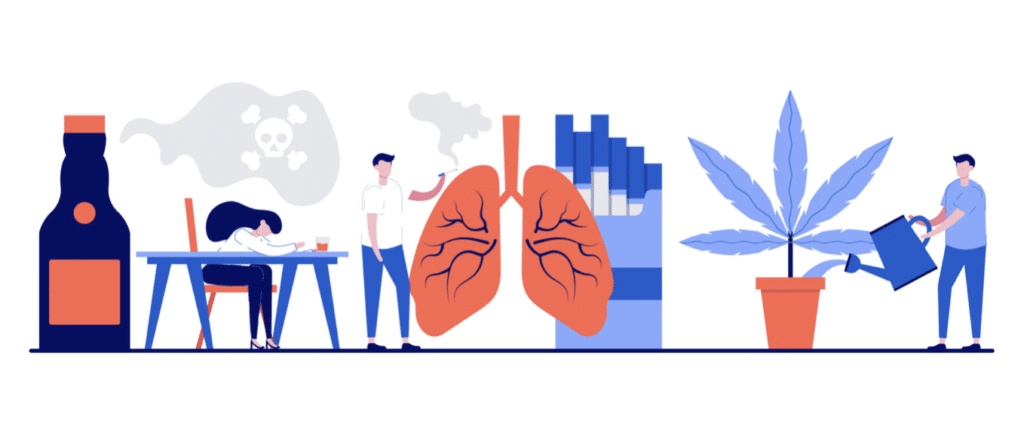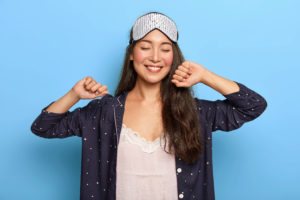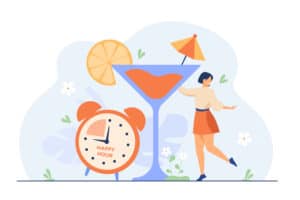
THE BOTTOM LINE:
Many commonly consumed foods and over-the-counter medications disrupt sleep
Learn how to time substances to reduce their impact on your sleep
Sometimes it’s best to avoid use altogether or use a substitution
You may or may not be surprised to learn that many substances, over-the-counter medications, and even some commonly consumed foods can interfere with your sleep. Learn how common substances, like nicotine or allergy medication, can impact your sleep and what you can do to prevent it!
ALCOHOL
Alcohol is an extremely popular substance used by people all over the world to relax inhibitions, reduce stress levels, or just to enjoy a night out on the town! It causes a sedative effect in your body by mimicking an important chemical messenger that decreases activity in your nervous system, which is why it is also commonly used as a sleep aid. Learn more about how alcohol wreaks havoc on your slumber.
Alcohol and sleep
While alcohol causes a sedative effect in your body, it is actually quite a little sleep-disrupter! It increases the likelihood of sleep-disordered breathing (snoring and sleep apnea) and reduces REM sleep (very important for mental restoration, memory, and emotional processing).
Skip the nightcap
Research has shown that alcohol can negatively impact your sleep when consumed up to six hours before bedtime, but most guidelines suggest having your last drink 3-4 hours before you want to sleep.
Helpful supplements
Dihydromyricetin (DHM) is not a cure, but if taken two hours before drinking can reduce some long-term pain. Learn more about how DHM can help save your sleep after a night of drinking.
CAFFEINE
Some people quite literally cannot begin their day without that morning cup of joe! Caffeine use is one of the most common ways to increase alertness. It can also give a little boost to your dopamine levels, elevating mood and improving focus. Plus, and it tastes like, really good!
Caffeine and sleep
Caffeine can seriously screw with your sleep at night. It blocks a chemical in your brain called adenosine that causes you to feel sleepy. It also boosts your adrenaline and reduces melatonin production. Learn tips for how to enjoy your brew and sleep good, too.
Limit your intake
Keep away from caffeine after 2 pm and limit your daily intake to 250-400mg (around 2-3 cups of coffee). Watch out for sneaky caffeine in things like diet pills, headache medication, and many common foods.
Helpful supplements
L-theanine is an amino acid found in tea leaves. Take 100mg of L-Theanine with 200mg of caffeine to significantly improve attention and cognitive performance!
NICOTINE
Nicotine is a bit of a paradox– some use it for energy, while others use it as a form of anxiety reduction. Nicotine is primarily a stimulant that works immediately on your adrenal glands and also causes the body to release glucose. Consuming nicotine is similar to eating a sugary snack in that way. Nicotine can also reduce anxiety and lead to addiction due to its effects on dopamine and endorphins associated with the brain’s reward circuits. The most common way people use nicotine is through smoking cigarettes.
Nicotine and sleep
Nicotine is a stimulant and stimulants are very disruptive to sleep. Nicotine impacts your sleep by causing fragmented sleep patterns, and insomnia. It can even reduce REM sleep. Heavy smokers may also experience withdrawal throughout the night which further reduces sleep quality. Smoking cigarettes makes you more likely to snore and raises your risk of sleep apnea.
Be a quitter
The only way you can make sure that your nicotine use is not going to affect your sleep is to quit smoking. Initially, withdrawal from nicotine may disrupt your sleep but once your body has adjusted, your sleep will normalize.
Helpful substitutes
Avoid smoking within four hours of bedtime, if possible. You can try to cut down on your regular form of nicotine-use (i.e. cigarettes, e-cigarettes, chewing tobacco) with products that supply lower doses of nicotine (skin patch, gum, lozenges, nasal spray, inhaler). Decreasing your use over time will lessen sleep disruptions and help you get the quality sleep you need.
COLD & FLU OR ALLERGY MEDICATION
Many common over-the-counter medications contain active ingredients that can be very disruptive to sleep:
Pseudoephedrine (Sudafed)
Pseudoephedrine is a decongestant commonly used to quickly treat nasal and sinus congestion. It works by shrinking dilated blood vessels in your nasal passages that cause congestion.
Pseudoephedrine and sleep: It is a stimulant and wakefulness agent, so frequent use can cause restlessness and can lead to insomnia.
Limit your use: Pseudoephedrine is often taken before bed to treat nasal and sinus congestion that hinders your sleep, which is fine as long as it’s used exactly as directed. Never use larger doses than recommended and stop use after 7 days in a row to decrease the chances of sleep disturbances.
First generation antihistamines
The next 4 antihistamines we are going to talk about work by binding to receptors in your central nervous system which normally help regulate your sleep-wake cycle. This is why taking first-gen antihistamines can cause you to feel sedated or drowsy. One of the more severe side effects is poor sleep quality including parasomnias, such as sleepwalking. This might be because first-gen antihistamines speed up the onset of REM sleep in your sleep cycle, and reduce the total duration of REM sleep, which we know is important for emotional processing, memory reconsolidation, and improving problem-solving skills.
Diphenhydramine (i.e. Benadryl, Sudafed PE day/night)
This is a very popular antihistamine for today’s use of treating the symptoms of allergies or the common cold and flu, such as sneezing, itchiness, dry eyes, and runny nose. It also treats the itchiness caused by insect bites or poison ivy. It works by blocking the histamine that your body naturally produces during a reaction caused by allergies, insects, etc.
Diphenhydramine and sleep: It makes you incredibly drowsy. I’m talking knocks you out level of drowsiness. In fact, it is sometimes used to treat insomnia, and more controversially, to make children sleep on long flights.
Limit use: It is easy to develop a tolerance to diphenhydramine, so it’s important to limit use so your body’s response to the drug doesn’t decrease over time. Also, it can sometimes have the opposite effect, called a paradoxical reaction, where some individuals report hyperactivity instead of sedation.
Chlorpheniramine (i.e. Chlor-Trimenton, Aller-Chlor, Comtrex)
This antihistamine is commonly used to treat allergic conditions, such as hay fever, and other allergy and cold symptoms such as sneezing, itchy or watery eyes, and runny nose. It is taken in pill form and works by blocking the histamine that your body naturally produces during an allergic reaction.
Chlorpheniramine and sleep: It has a half-life of 24 hours, which means that it works very slowly and can take up to 2 full days for the active ingredient to leave your body.
Limit use: If you’re taking this medication every 4-6 hours, you can imagine that it will be hard to shake off that sleepy side-effect during the day, and even harder to avoid the sleep disturbances to your REM cycles at night.
Brompheniramine (Dimetapp)
This antihistamine used to suppress symptoms caused by allergic conditions such as sneezing, itchy or watery eyes, and runny nose. It is taken in liquid form and works by blocking the histamine that your body naturally produces during an allergic reaction.
Brompheniramine and sleep: The half-life is reported to range from 12-35 hours, making it extremely difficult to gauge how long this will stay in your body. On the higher end, it suggests that it could take several days for the active ingredient to leave your body.
Limit use: Brompheniramine should only be for short-term use until symptoms clear, and will not treat the cause of the symptoms.
Doxylamine (Unisom)
This antihistamine used to treat the symptoms of allergies, including hives and skin rashes, in addition to sneezing, itchy or watery eyes, and running nose. It works by blocking the histamine that your body naturally produces during an allergic reaction, and has also been used to treat sleep disorders because of its sedative effects.
Doxylamine and sleep: Not only will it make you drowsy upon taking it, but it has a half-life of 10-12 hours meaning it can be associated with next-day grogginess and fatigue.
Limit use: Doxylamine has been linked to unintentional deaths so it is extremely important to use it exactly as directed.
Helpful alternatives that don’t mess with sleep:
Loratadine or Allegra: These second-generation antihistamines do not contain sedative properties so they can fight your symptoms and are less likely to cause sleep disruptions.
Eucalyptus oil: Open up those sinuses and fight mucus by rubbing one drop on your temples or chest. Make sure you are using food-grade eucalyptus oil.
Neti pot: Research has shown that this technique can help alleviate your symptoms. Fill your neti pot with saline solution, hold your head over your sink at a 45-degree angle, insert your neti pot into your nostril, and carefully pour the solution down your nostril (easy peasy)!
SNACKS THAT DISRUPT SLEEP
Candy, chocolate, cookies, and cake are all common foods filled with high levels of sugar, but I bet you didn’t realize that foods like white bread, pasta, ketchup, and cereal also have very high sugar levels. It might seem like common sense that these sugary foods disrupt your sleep, but did you also know that high-fat or spicy foods can also interfere with your sleep?
Sugary food and sleep
It is probably not a surprise that sugar gives you energy. High levels of sugar consumed throughout your day can cause sleep disturbances and less time in deep slow-wave sleep.
High-fat food and sleep
High-fat foods may cause you to have a fragmented sleep at night. Researchers have found that high-fat foods decrease sensitivity to the brain chemical, orexin, which is helpful in maintaining the body’s sleep and wakefulness.
Spicy food and sleep
Spicy foods can cause heartburn, acid reflux, and in more severe cases gastroesophageal reflux disease (GERD), which can all make sleeping more difficult because the symptoms get worse when you lie down.
No snacks before bed
Stop eating about 2-3 hours before you go to bed. This will give your digestive system time to break down those sugary, high-fat, and spicy foods before you hit the hay.
Helpful substitutes
If you’re in need of a bedtime snack, try reaching for some of these foods that might actually help with your sleep quality:
- Beans, lentils, or nuts: These foods are high in tryptophan, which is known to boost your sleep quality.
- Whole wheat toast or oatmeal: These foods are complex carbohydrates, which are known to trigger the release of serotonin, which is an important brain chemical for sleep-wake regulation.






